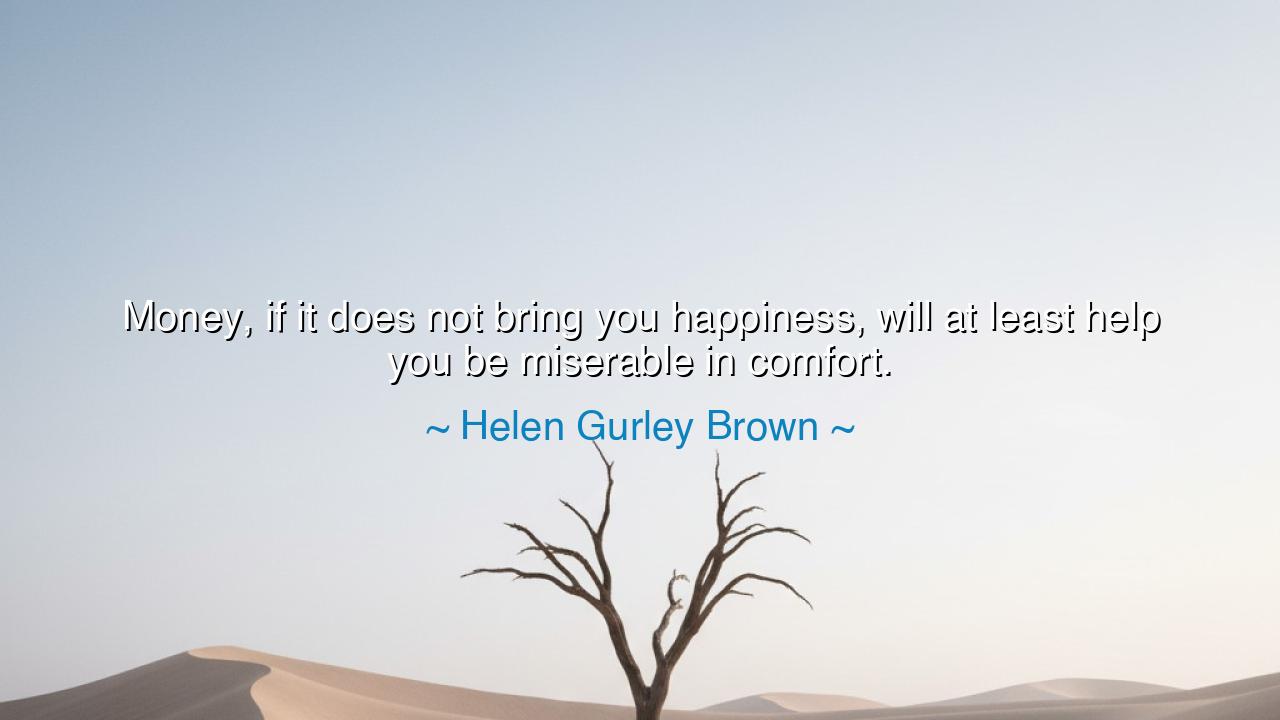
Money, if it does not bring you happiness, will at least help you
Money, if it does not bring you happiness, will at least help you be miserable in comfort.






Helen Gurley Brown, the trailblazing editor and author of Sex and the Single Girl, once spoke with characteristic wit and candor: “Money, if it does not bring you happiness, will at least help you be miserable in comfort.” These words, at once humorous and profound, reflect the eternal tension between wealth and contentment, between the outer luxuries of life and the inner peace of the heart. Beneath her irony lies an ancient truth: that while money cannot purchase joy, it can soften the burdens of existence — yet if the soul remains unfulfilled, even comfort becomes a gilded cage.
To understand this quote, we must first understand the world from which Helen Gurley Brown spoke. In the mid-twentieth century, she rose from humble beginnings to become one of the most influential women in media, a voice for ambition and independence in a world that often denied such freedom to women. She knew the value of money, not as a symbol of greed, but as a key to autonomy — a means of escaping dependence, fear, and limitation. When she said money could help one “be miserable in comfort,” she was not mocking ambition, but acknowledging that material ease, though incomplete, is far preferable to suffering in deprivation. She recognized that while wealth cannot heal the spirit, poverty can wound it deeply.
There is a deep irony here, one that philosophers have long pondered. Epicurus, the ancient Greek sage, taught that happiness does not arise from riches, but from the absence of want. Yet even he did not reject comfort; he understood that hunger and insecurity crush the human spirit. Thus, Brown’s statement is not cynicism — it is realism tempered by wisdom. She knew that comfort may not save you from sorrow, but it gives you space to breathe, to think, to recover. In a world filled with hardship, the ability to suffer softly, in warmth and safety, is itself a small mercy.
History has given us many examples of this paradox. Consider Marie Antoinette, surrounded by wealth beyond measure, yet imprisoned within the cold splendor of Versailles. Her silks could not shelter her from loneliness; her jewels could not protect her from tragedy. And yet, on the other side of history, think of the countless nameless poor who suffered not from sorrow alone, but from hunger, cold, and exhaustion. The queen’s misery, though tragic, was cushioned by gold; the peasant’s misery was raw, merciless, and unrelenting. Brown’s quote dwells in this contrast — a reminder that though wealth cannot grant happiness, poverty magnifies suffering.
Still, there is a warning hidden within her humor. The pursuit of money, if mistaken for the pursuit of meaning, becomes its own form of enslavement. To fill the emptiness of the soul with possessions is to chase a mirage in the desert — the thirst remains. Brown, who built her life on ambition, understood this too. She never claimed that money would save one’s heart; she simply reminded us that it cushions life’s inevitable blows. To believe otherwise, to equate comfort with contentment, is to mistake the wrapping for the gift. True happiness, as every sage has taught, must be cultivated within — through love, purpose, and gratitude.
We may recall here the life of John D. Rockefeller, once the richest man in the world. In his later years, tormented by illness and regret, he discovered that no fortune could buy him peace. It was only when he began giving away his wealth — building schools, hospitals, and foundations — that his health and spirit began to heal. In giving rather than hoarding, he transformed money from comfort into meaning. Thus, Brown’s statement, when read deeply, contains both irony and wisdom: that money can ease your misery, but only generosity, creativity, and compassion can transform it into joy.
So, my listener, take this teaching into your heart. Do not worship money, but do not despise it. See it for what it is — a tool, not a treasure; a means, not an end. Use it to build comfort, yes, but also to create beauty, to serve others, to free yourself from fear. Remember that happiness does not dwell in mansions or coins, but in the quiet harmony of a soul at peace with its choices. Yet know also that life’s storms are easier to endure with shelter, warmth, and bread on the table. As Helen Gurley Brown reminds us, if money cannot make you happy, it can at least keep your misery dry and warm — and from that place of comfort, perhaps, you will find the courage to seek what truly fulfills you.






AAdministratorAdministrator
Welcome, honored guests. Please leave a comment, we will respond soon